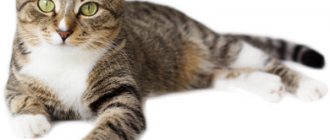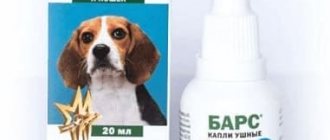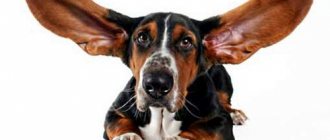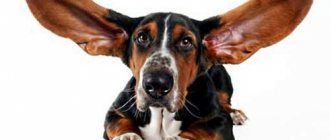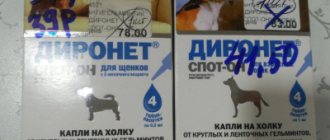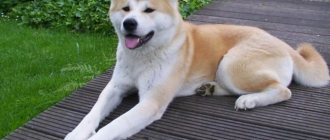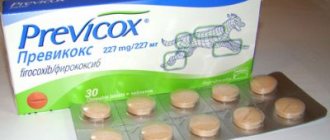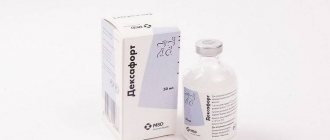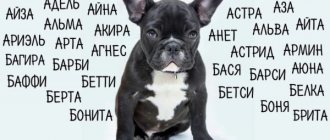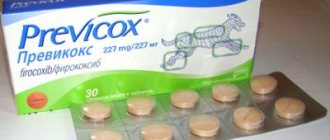Otitis in dogs is an unpleasant and difficult to treat disease. It often recurs, its therapy is long, and the cause is difficult to determine, since the pathology is provoked by various factors: mites, allergies, poor diet, hypothermia, decreased immunity, etc. But almost always a bacterial or fungal infection occurs, which further aggravates the animal’s condition.
To treat otitis, ear drops for dogs Otibiovin are produced. They are considered the best among similar drugs.
In the review I will consider: is Otibiovin really the best in its class, how it works, the features of its use, possible adverse reactions and whether there are cheaper analogues. At the end of the article you will find answers to your questions, reviews from the owners and my recommendations for the treatment of otitis media.
Is it possible?
The veterinary drug was developed for the treatment of acute external otitis. Helps with short-term exacerbations of acute signs of chronic otitis of bacterial and mycotic origin caused by gentamicin-sensitive bacteria.
Otibiovin drops are a combination of drugs with antibacterial, anti-inflammatory and antifungal properties. At an early stage of inflammation with a preserved microbial ecosystem, the progression of the disease and pathological secondary changes are prevented.
Indications for use
The combined drug is used to treat ear infections of bacterial and fungal etiology. In particular, drops are prescribed for treatment in dogs:
- external otitis;
- eczema of the ears and ear canal;
- superficial dermatitis (including allergic) affecting the ear area.
Otibiovin shows high effectiveness in the treatment of acute inflammation.
Compound
The suspension for administration into the external auditory canal contains a broad-spectrum antibiotic – gentamicin sulfate. Other Ingredients:
- synthetic corticosteroid (triamcinolone acetonide);
- salicylic acid;
- prednisolone acetate;
- methylcarbinol;
- water for injections.
The veterinary medicinal product is a soft, homogeneous, viscous, colorless suspension. Available packaged in dropper bottles of 15, 20 and 25 ml. In case of accidental contact with the animal's eyes, rinse them thoroughly with water.
How it works
Otibiovin is a drug with a wide spectrum of antifungal and antibacterial action. The therapeutic effect is achieved through the interaction of 3 active components:
- Gentamicin sulfate. Aminoglycoside antibiotic. Affects some fungi, a number of gram-positive and most gram-negative bacteria: E. coli, Klebsiella, Salmonella, Shigella, Mycoplasma, Enterobakter aerogenes, Pseudomonas aeruginosa, Campylobakter fetus subsp.jejuni, Proteus spp., Actinobacillus spp.
- Salicylic acid. Disinfects the ear linen, soothes, relieves tissue irritation.
- Triamcinolone acetonide. Semi-synthetic corticosteroid. Eliminates inflammation, irritation, swelling and redness.
Instructions for use
Before using the medicine, you need to make sure that the eardrum is not perforated. To do this, it is necessary to carefully examine the external auditory canal; before treatment, it must be thoroughly cleaned and dried.
If Otibiovin is stored in the refrigerator, you need to warm it up by placing the container in a bowl of warm water for a few minutes. Shake well before use:
| Weight less than 15 kg | Weight more than 15 kg | Duration of therapy |
| Place 4 drops into the ear canal 3-4 times a day | Place 5-6 drops into the ear canal 3-4 times a day | 5-7 days in a row until signs of the disease disappear |
After application, gently massage the ear to ensure distribution of the drug in the lower part of the ear canal.
Side effects
Failure to follow the instructions for use of the veterinary product will increase the incidence of gentamicin-resistant bacterial populations and reduce the effectiveness of treatment with other aminoglycosides for possible cross-resistance.
Local erythema may occur, which disappears after cessation of treatment. Temporary hearing loss has been recorded in older dogs. If during the course of treatment problems with the vestibular system or hearing are noted, the use of ear drops should be stopped immediately and the ear canal should be thoroughly rinsed with an aqueous solution.
Long-term and extensive topical use of corticosteroids causes common side effects (suppression of adrenal function, thinning of the skin, poor wound healing).
Different breeds
The medicine has restrictions on its use. In animals at risk of developing allergic reactions, the use of drops should be under medical supervision. Dogs that need to use a germicide with caution:
- Terriers.
- Retrievers.
- Flat-faced breeds.
Otibiovin is prescribed strictly according to the pet’s weight, and not by eye. If hypersensitivity to a component of the product is known, contact with drops should be avoided.
Answers to frequently asked questions
Can Otibiovin be used in pregnant dogs?
Due to the antibiotic and corticosteroid content of the drug, it is not advisable to use it in puppy dogs. But if necessary, drops are used in pregnant and lactating dogs as prescribed and under the supervision of a veterinarian.
Can the drops be used on puppies?
The instructions do not indicate age restrictions. Medicines are used from the first weeks of life. But if bacteria or fungi are not susceptible to the solution and multiply excessively, the drops are canceled and appropriate therapy is prescribed.
How to store the medicine?
Otibiovin is stored in a dry, dark place at a temperature of +15–25°C, away from children and animals. An unopened bottle does not lose its properties for 2 years; Once opened, use within 12 days, the remainder is thrown away. Therefore, it is better to take a small bottle: you will throw away most of it.
Does the drug help against ear mites?
No, the solution does not contain substances active against ear mites. But it may be prescribed as an additional drug if otodectosis is complicated by a bacterial or fungal infection.
Reviews
Owners
Olga, 25 years old, Orel:
“I have an elderly dog with a pathological hatred of veterinarians. The dog panics when they try to examine the ears. On the doctor's recommendation, I used Otibiovin. After the first 4 drops, the pet felt noticeably better.”
Kirill, 36 years old, Moscow : “My dog Salky hates ear drops of any kind. We tried different brands of drops, but Otibiovin is an effective drug. Stops inflammation in your pet, destroys infections and discharge.”
Veterinarians
Alexey, veterinarian, 45 years old, Magnitogorsk:
“This veterinary drug is an aminoglycoside antibiotic that acts bactericidal by inhibiting protein synthesis. A synthetic analogue of dexamethasone, a corticosteroid, has anti-inflammatory and itch-inhibiting effects in the local treatment of otitis externa.”
Irina, veterinarian, 35 years old, Yaroslavl:
“Otibiovine is a broad-spectrum drug used to treat skin infections caused by various types of pathogenic dermatophytes and yeasts. It has low mineralcorticosteroid activity. Active against gram-positive and gram-negative bacteria."
Purpose
Otibiovin cannot be used for self-medication: only a veterinarian can determine the cause of inflammatory processes in a cat’s ears. Drops are used to treat:
- otitis caused by pathogenic bacteria and fungi;
- otodectosis;
- allergic dermatitis and other ear diseases.
Before drawing up a treatment regimen, the veterinarian determines the type of pathogen and tests it for sensitivity to antibacterial and antifungal substances contained in the drug.
Otitis in a cat
The inflammatory process in the ears of pets can be fungal or bacterial in nature. In both cases, the disease is dangerous due to its complications:
- possible hearing loss and even deafness;
- in advanced cases – the development of meningitis or meningoencephalitis, which lead to the death of the pet;
Pathology can affect different parts of the hearing organ, in this case there are:
- otitis externa - inflammation affects the visible parts of the ear, is treated quickly, and practically does not cause chronicity;
- Otitis media - develops in the middle parts of the ear canal, is more difficult to treat and often becomes a chronic pathology. In this case, the cat will experience periodic (often seasonal) relapses, which are accompanied by pain syndromes, and the pet will become nervous and aggressive. A progressive disease often requires surgical intervention, and no veterinarian can guarantee a complete guarantee of recovery;
- Internal otitis is the most dangerous type of inflammation affecting parts of the inner ear. It often causes deafness, and if left untreated, the pus penetrates the brain structures, leading to death.
Based on the type of causative agent of the inflammatory process, several types of otitis in animals are classified:
- parasitic - develops as a result of damage to the auricle by a mite. By infecting the upper layers of the skin, the mite helps create a favorable environment for the development of pathogens. The bacteria feed on waste products of fleas and ticks and their saliva;
- allergic otitis media - occurs as a result of a specific reaction to food allergens, helminthiases, and saliva of parasites. Fungal and bacterial infections are often associated with allergies, so treatment is usually complex.
Otitis can be caused by injury, hypothermia, and lack of necessary hygiene, resulting in the ear canal becoming clogged with wax. But Otibiovin is prescribed only for bacterial and fungal etiology of the disease.
Analogs
Pharmacies offer a large selection of veterinary antibacterial analogues of Otibiovin:
- Anandin is an antimicrobial agent, heals wounds, helps restore the skin of the ears. Price – 150 rub. per package.
- Acaricidal suspension Amitrazine . Used for the treatment of otitis media and skin pathologies in dogs. Well tolerated and has no dangerous side effects. Cost – 80 rub. for 10 ml.
- Posatex is an antifungal agent, suitable for puppies from 3 months. The average price is 860 rubles per bottle.
- Oricin is a veterinary drug that relieves inflammation and relieves pain. Use may cause both local and systemic effects (adrenal suppression and slower healing process). Price – from 560 rub. for 25 ml.
To prevent dangerous conditions, it is necessary to purchase analogues in veterinary pharmacies only as prescribed by a veterinarian.
conclusions
Otibiovin is a good drug.
The antibiotic in its composition copes with almost all bacteria that cause otitis media. And the corticosteroid and salicylic acid relieve inflammation and irritation after the first use. Plus, it is well tolerated by dogs: in my practice, I have not observed allergies or other side effects to this drug. But I prefer to prescribe the Belarusian analogue Otibiovet Neo. It is similar in composition and has a better antibacterial and antifungal effect due to the introduction of carbetopendicinium bromide. Plus it costs twice as much.
It is important to understand that Otibiovin and similar solutions are not used without prior examination. A cytological analysis is needed to determine the type of otitis media and what pathogens it is caused by. If you treat ear inflammation due to otodectosis or allergies, you will only worsen the situation. In the first case, Anandin Plus will be effective, in the second - Otospectrin.
In addition, drops in the ears are only one way to treat otitis media. Additionally, you need to use disinfectant solutions, stimulate the immune system, and in serious cases, use antibiotics or antimycotics.
If your dog has bacterial or fungal otitis, and the veterinarian prescribed Otibiovin, feel free to use these ear drops: they are safe and work well against the disease. But check if you can replace them with Otibiovet Neo: this way you will save.
